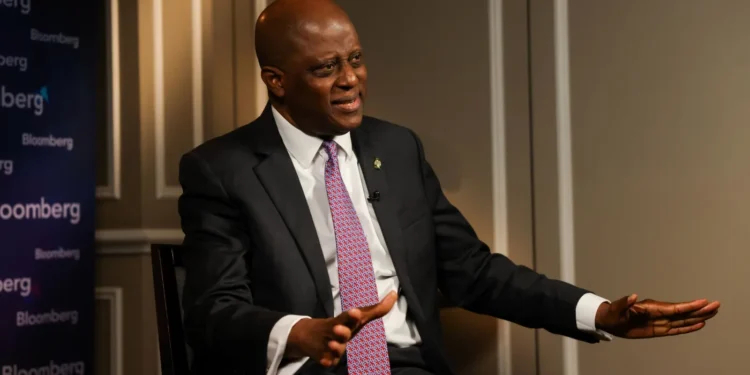The Governor of the Central Bank of Nigeria (CBN), Mr Olayemi Cardoso, has emphasised the need for deeper backward integration in the telecommunications sector, urging industry players to localise key supply chains and reduce dependence on foreign exchange.
This is according to a press statement issued by the apex bank on Thursday.
According to the statement, Cardoso stressed that telecom firms must take concrete steps to produce essential components such as SIM cards, cables, and towers locally.
He said this in Abuja on Wednesday during a courtesy visit by Airtel Africa’s management team led by Group Chief Executive Officer, Mr Sunil Taldar.
According to him, this would ease pressure on dollar demand, create jobs, and strengthen the broader economy.
The apex bank chief noted that the CBN has spent the last 16 months stabilising the foreign exchange market, strengthening the naira’s competitiveness, and boosting investor confidence in the Nigerian economy. With these gains, he said, telecom companies must now embrace local production to consolidate economic progress.
CBN to expand digital financial services
Beyond industry reforms, Cardoso outlined the CBN’s broader vision of improving financial inclusion and enhancing digital payment solutions for everyday Nigerians. He announced plans for a high-level summit, where the central bank will collaborate with key industry stakeholders to develop strategies for expanding financial services, especially to underserved and rural communities.
“The CBN is committed to ensuring that financial services reach more Nigerians, especially in rural and underserved communities. Through collaboration with relevant agencies and industry players, we aim to build a more inclusive and digitally-driven financial ecosystem,” Cardoso said.
He assured telecom operators that the CBN would continue to create an enabling environment for financial service providers, fostering competition, innovation, and accessibility for consumers.
Airtel committed to financial inclusion
In response, Airtel Africa’s Group CEO, Mr. Sunil Taldar, commended the CBN’s economic reforms and expressed support for backward integration in the telecom sector. He noted that reducing reliance on foreign exchange was in the long-term interest of telecom operators and the broader economy.
Taldar, who was accompanied by Airtel Nigeria CEO, Mr Dinesh Balsingh; Group CFO, Mr Jaideep Paul; and Director of Corporate Communications & CSR, Mr Femi Adeniran, reiterated Airtel’s commitment to deepening financial inclusion through technology-driven solutions. He pledged continued collaboration with regulators to drive digitisation and economic growth in Nigeria.
What you should know
- The Nigerian Communications Commission (NCC), Nigeria’s telecom industry regulator, had in January approved a 50% tariff adjustment for telecom operators, citing rising operational costs and the need to sustain the industry.
- This decision was made under the Commission’s regulatory authority as outlined in Section 108 of the Nigerian Communications Act, 2003, which empowers the NCC to regulate and approve telecom tariffs and charges.
- The NCC’s approval was a response to requests from telecom operators, who had initially sought a 100% increase in tariffs to address escalating operational expenses.
- The Commission, however, settled on a 50% adjustment after considering the prevailing economic conditions and the need to balance operator sustainability with consumer protection.













